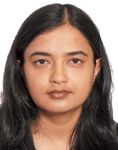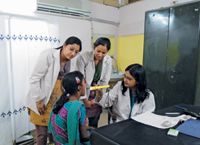- Acne
- Actinic Keratosis
- Aesthetics
- Alopecia
- Atopic Dermatitis
- Buy-and-Bill
- COVID-19
- Case-Based Roundtable
- Chronic Hand Eczema
- Chronic Spontaneous Urticaria
- Drug Watch
- Eczema
- General Dermatology
- Hidradenitis Suppurativa
- Melasma
- NP and PA
- Pediatric Dermatology
- Pigmentary Disorders
- Practice Management
- Precision Medicine and Biologics
- Prurigo Nodularis
- Psoriasis
- Psoriatic Arthritis
- Rare Disease
- Rosacea
- Skin Cancer
- Vitiligo
- Wound Care
Article
Indian dermatologist uses networking to unite physicians around the world
Author(s):
Dermatologist Rashmi Sarkar, M.D., doesn't see the more than 7,000 miles separating her home country from the United States as a networking obstacle. In fact, she has taken a special interest in bringing the worlds of dermatology in India and America together.

Key Points

Dr. Sarkar, associate professor in dermatology, Maulana Azad Medical College, New Delhi, says it was her research in melasma that first got the attention of the 2006 American Academy of Dermatology annual meeting. Since then, she has not only presented research at major dermatology meetings, but has also built bridges between dermatologists in India and those globally.
Researcher, teacher

"People here are very particular about having any kind of skin pigmentation or blemishes on the faces. Getting good job opportunities - even marriage prospects of young girls - are very much hampered if they have facial blemishes. The pigmentation affects one's standing in society, to a certain extent," she says.
Her studies looking at treating dark-skinned melasma patients with chemical peels; using chemical peels and topical hydroquinone and triple combination; and treating melasma in men have garnered international attention. Four of those studies in the last decade were published in Dermatologic Surgery and Journal of European Academy of Dermatology and Venereology, and she has been invited to speak about melasma and hyperpigmentation at American Academy of Dermatology meetings in 2006, 2011 and 2012.
Dr. Sarkar's most recent study, published July 2010 in Journal of European Academy of Dermatology and Venereology, delineated clinical etiological and histological features of melasma in dark-skinned males. She says she and her colleagues found that melasma is observed frequently in Indian men, although less commonly than women (Sarkar R, Puri P, Jain RK, Singh A, Desai A. J Eur Acad Dermatol Venereol. 2010;24(7):768-772).
International outreach
In addition to her faculty position in New Delhi, Dr. Sarkar encourages collaboration and networking among dermatologists in India and those in other parts of the world - especially the United States. To do that, she has taken on roles in professional organizations, domestically and internationally.
Earlier this year, colleagues elected Dr. Sarkar to the seven-member executive committee of the Indian Association of Dermatologists, Venereologists and Leprologists (IADVL).
Dr. Sarkar is also the international representative on the Women's Dermatologic Society's (WDS) board of directors, and she is currently the co-chair of the WDS's International Affairs Committee.
Late last year, Dr. Sarkar brought the organizations together by hosting a WDS networking reception and retreat at the IADVL's annual conference in New Delhi. She has since organized similar meetings at three national dermatology conferences (Dermacons). WDS members have attended, including the organization's president, Janet Hickman, M.D.
It was during the WDS's board of directors meeting at the annual AAD meeting in March that it was announced Dr. Sarkar had spearheaded a new joint Women's Dermatologic Society-Indian Women's Dermatologic Society, the bylaws of which were voted and approved by WDS members that day.
One of Dr. Sarkar's main goals has been to encourage female dermatology colleagues in India to network internationally. So far, membership in the Indian Women's Dermatologic Society has gone from seven in early 2010 to more than 30 in May 2012.
Rashmi Sarkar, M.D.
Born: Lucknow, India
Medical degree: Dayanand Medical College Ludhiana, Punjab, India
Internship: General Hospital, Chandigarh, India
Residency, dermatology: Post Graduate Institute of Medical Education and Research (P.G.I.) Chandigarh, India
Hobbies: Music, singing, traveling, writing
Family: Husband Srikanta Basu, M.D., associate professor in pediatrics, Lady Hardinge Medical College in New Delhi; 9-year-old son, Abhik
Newsletter
Like what you’re reading? Subscribe to Dermatology Times for weekly updates on therapies, innovations, and real-world practice tips.
















